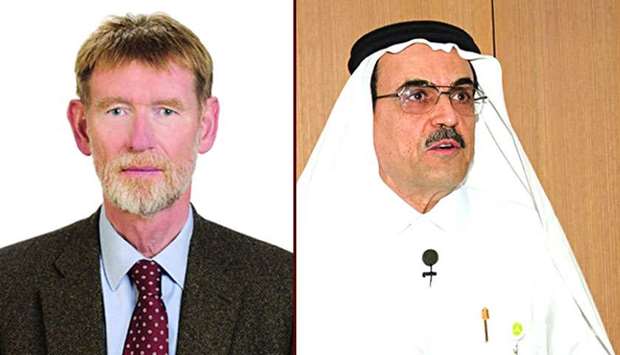Qatar has made significant efforts to reduce the impact of cancer on the country’s population, according to an expert from Hamad Medical Corporation (HMC).
“Qatar has made a commitment to prioritise actions to address cancer in line with the plans set out in the national health strategies," said Prof Karl Alexander Knuth, medical director and CEO of National Center for Cancer Care and Research (NCCCR), HMC.
Improvements such as the implementation of vaccination programmes which prevent infections that cause cervical and liver cancer, improved access to screening programmes for breast and bowel cancers, and tobacco taxation, regulation and control are all actions designed to reduce the burden of cancer in the country, he said.
According to the World Health Organisation, cancer is the second leading cause of death globally and was responsible for estimated 9.6mn deaths in 2018. Worldwide, around one in six deaths is due to cancer.
In Qatar, the most recent data released by the Qatar National Cancer Registry shows that in 2015 there were 1,465 new patients diagnosed with cancer, of which 44% were female and 56% male.
Dr Mohamed Ussama al-Homsi, senior consultant, Oncology Department, NCCCR, said World Cancer Day provides an opportunity to highlight the importance of cancer prevention and detection strategies and also to raise awareness of treatment options.
“World Cancer Day, observed on February 4 annually, represents a unique opportunity to draw attention to what can be done to address cancer and to prevent millions of deaths,” said Dr al-Homsi.
“Around one-third of common cancers are preventable and millions of lives could be saved globally each year by implementing resource-appropriate strategies for prevention, early detection, and treatment. For this reason, as oncology experts, we urge people to take a positive and proactive approach in the fight against cancer,” added Dr al-Homsi.
To mark World Cancer Day, HMC is holding a number of activities aimed at raising awareness about the importance of cancer prevention and early detection. Planned activities also aim to dispel myths about cancer that can adversely affect people’s attitude toward accessing early diagnosis, treatment, and care.
“Through our planned activities, we aim to increase awareness of the risk factors for cancer, such as tobacco use, being overweight, eating an unhealthy diet, and lack of physical activity. The focus is also on making the public aware of available screening programmes, the human papillomavirus vaccination, and cancer care available here in Qatar. World Cancer Day provides an opportunity to reflect on what each of us as individuals can do to reduce the impact of this devastating disease, now, and in the future,” added Dr al-Homsi.
Improvements such as the implementation of vaccination programmes which prevent infections that cause cervical and liver cancer, improved access to screening programmes for breast and bowel cancers, and tobacco taxation, regulation and control are all actions designed to reduce the burden of cancer in the country, he said.
According to the World Health Organisation, cancer is the second leading cause of death globally and was responsible for estimated 9.6mn deaths in 2018. Worldwide, around one in six deaths is due to cancer.
In Qatar, the most recent data released by the Qatar National Cancer Registry shows that in 2015 there were 1,465 new patients diagnosed with cancer, of which 44% were female and 56% male.
Dr Mohamed Ussama al-Homsi, senior consultant, Oncology Department, NCCCR, said World Cancer Day provides an opportunity to highlight the importance of cancer prevention and detection strategies and also to raise awareness of treatment options.
“World Cancer Day, observed on February 4 annually, represents a unique opportunity to draw attention to what can be done to address cancer and to prevent millions of deaths,” said Dr al-Homsi.
“Around one-third of common cancers are preventable and millions of lives could be saved globally each year by implementing resource-appropriate strategies for prevention, early detection, and treatment. For this reason, as oncology experts, we urge people to take a positive and proactive approach in the fight against cancer,” added Dr al-Homsi.
To mark World Cancer Day, HMC is holding a number of activities aimed at raising awareness about the importance of cancer prevention and early detection. Planned activities also aim to dispel myths about cancer that can adversely affect people’s attitude toward accessing early diagnosis, treatment, and care.
“Through our planned activities, we aim to increase awareness of the risk factors for cancer, such as tobacco use, being overweight, eating an unhealthy diet, and lack of physical activity. The focus is also on making the public aware of available screening programmes, the human papillomavirus vaccination, and cancer care available here in Qatar. World Cancer Day provides an opportunity to reflect on what each of us as individuals can do to reduce the impact of this devastating disease, now, and in the future,” added Dr al-Homsi.

